

Here we'll get to know what are the common causes of stress, especially in a working environment, the effects of stress and how to manage it.
The Basics of Stress. Stress is a situation that triggers a particular biological response.
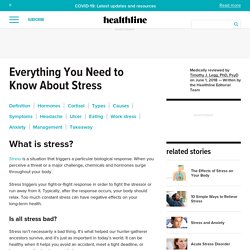
When you perceive a threat or a major challenge, chemicals and hormones surge throughout your body. Stress triggers your fight-or-flight response in order to fight the stressor or run away from it. Typically, after the response occurs, your body should relax. Too much constant stress can have negative effects on your long-term health.
Is all stress bad? Stress isn’t necessarily a bad thing. We all feel stressed at times, but what one person finds stressful may be very different from what another finds stressful. Daily Life - The American Institute of Stress. 2014 Stress Statistics General Stress Response Hans Selye defined stress as the body’s nonspecific response to any demand, whether it is caused by or results in pleasant or unpleasant stimuli.
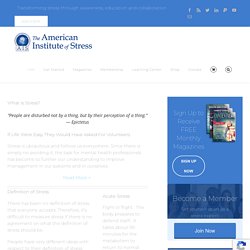
It is essential to differentiate between the unpleasant or harmful variety of stress termed distress, which often connotes disease, and eustress, which often connotes euphoria. During both eustress and distress, the body undergoes virtually the same non-specific responses to the various positive or negative stimuli acting upon it. However, eustress causes much less damage than distress.
Stress effects on the body. Musculoskeletal system When the body is stressed, muscles tense up.
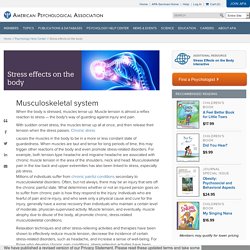
Muscle tension is almost a reflex reaction to stress — the body's way of guarding against injury and pain. With sudden onset stress, the muscles tense up all at once, and then release their tension when the stress passes. Chronic stress causes the muscles in the body to be in a more or less constant state of guardedness. Millions of individuals suffer from chronic painful conditions secondary to musculoskeletal disorders. Relaxation techniques and other stress-relieving activities and therapies have been shown to effectively reduce muscle tension, decrease the incidence of certain stress-related disorders, such as headache, and increase a sense of well-being. Respiratory system The respiratory system supplies oxygen to cells and removes carbon dioxide waste from the body. Some studies show that an acute stress — such as the death of a loved one — can actually trigger asthma attacks.
Cardiovascular Endocrine The HPA axis. What are the 5 stages of burnout? Where do you find yourself across these five stages of burnout?
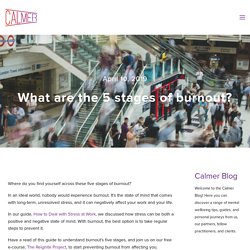
In an ideal world, nobody would experience burnout. How stress affects your body - Sharon Horesh Bergquist. 42 Worrying Workplace Stress Statistics - The American Institute of Stress. Effects of Stress in the Workplace statistics 20.
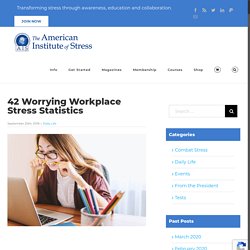
During 2018, 76% of US workers said that workplace stress affected their personal relationships. (Korn Ferry) This is another statistic that demonstrates just how much workplace stress affects other areas of our life. According to research by Korn Ferry, the majority of stressed employees reported that workplace stress has impacted upon their personal relationships in a negative manner. 21. Workplace Stress - The American Institute of Stress. Although the Institute is often asked to construct lists of the “most” and “least” stressful occupations, such rankings have little importance for several reasons.
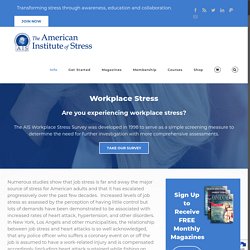
It is not the job but the person-environment fit that matters. Some individuals thrive in the time urgent pressure cooker of life in the fast lane, having to perform several duties at the same time and a list of things to do that would overwhelm most of us — provided they perceive that they are in control. They would be severely stressed by dull, dead-end assembly line work enjoyed by others who shun responsibility and simply want to perform a task that is well within their capabilities. The stresses that a policeman or high school teacher working in an inner city environment are subjected to are quite different than those experienced by their counterparts in rural Iowa.
Stress is a highly personalized phenomenon and can vary widely even in identical situations for different reasons. A whopping 92% of working Singaporeans are stressed – and women are prioritising families over themselves, study finds, Business Insider - Business Insider Singapore. Pexels.

Stress pie chart large. Stress Management: How to Reduce, Prevent, and Cope with Stress. It may seem that there’s nothing you can do about your stress level.
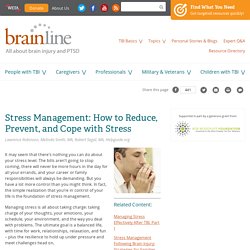
The bills aren’t going to stop coming, there will never be more hours in the day for all your errands, and your career or family responsibilities will always be demanding. But you have a lot more control than you might think. In fact, the simple realization that you’re in control of your life is the foundation of stress management. Managing stress is all about taking charge: taking charge of your thoughts, your emotions, your schedule, your environment, and the way you deal with problems.
The ultimate goal is a balanced life, with time for work, relationships, relaxation, and fun – plus the resilience to hold up under pressure and meet challenges head on. Coping with stress at work. Everyone who has ever held a job has, at some point, felt the pressure of work-related stress.
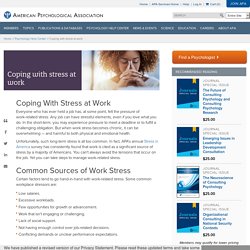
Any job can have stressful elements, even if you love what you do. In the short-term, you may experience pressure to meet a deadline or to fulfill a challenging obligation. But when work stress becomes chronic, it can be overwhelming — and harmful to both physical and emotional health. The Workplace Stress Solution. Samaritans of Singapore (SOS) Coping with Stress. The most dangerous aspect of stress is how easily it can creep up on you.
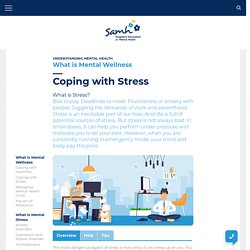
You think that you got used to it. It may start to feel familiar, or even normal. You may not notice how much it is affecting you, even as it exacts a heavy toll. If you often feel frazzled and overwhelmed, it is time to take action to bring your emotional and physical health back on track.